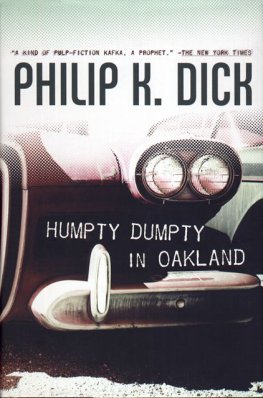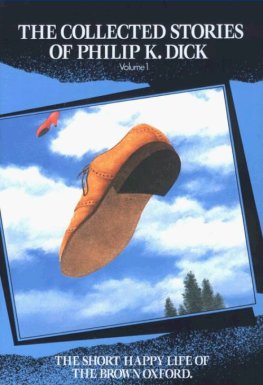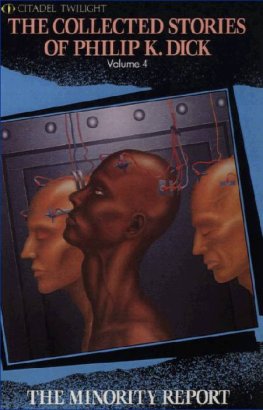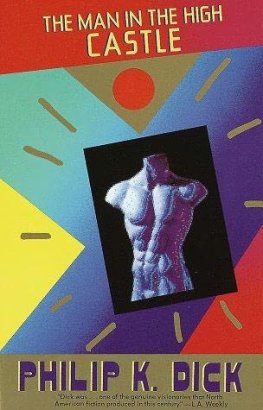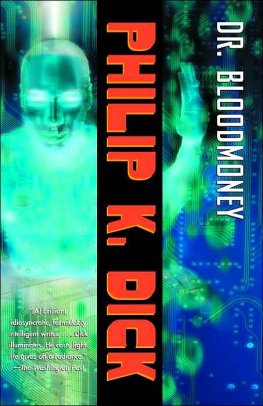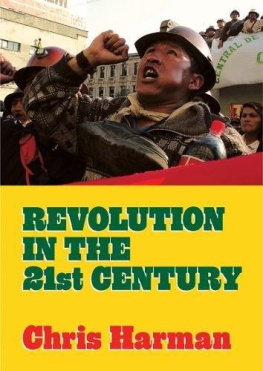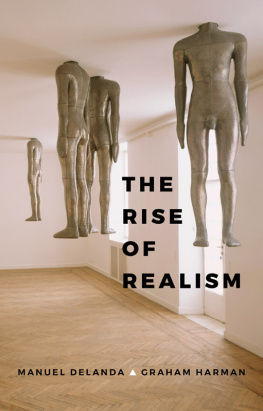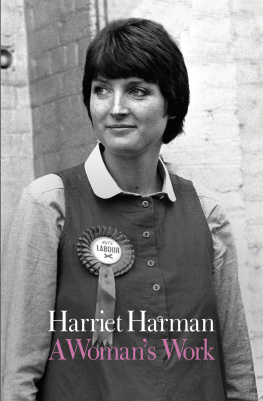Humpty Dumpty In Oakland
by Philip K. Dick
(Text on the dust jacket)
A kind of pulp-fiction Kafka, a Prophet.
The New York Times
One of the most original practitioners writing any kind of fiction.
The Sunday Times (London)
Remarkable... echoes of Dicks contemporaries such as Ralph Ellison, Richard Yates, Rod Serling, Raymond Chandler, and early Kurt Vonnegut, Jr., resonate, and a bonus exists in Dicks impeccable eye for detail Dicks fans will be in rapture.
Publishers Weekly on
Voices from the StreetIt may be hard For some to accept that the same writer who recently snuck into the American canon as a visionary and paranoid pop surrealist also penned a half dozen or more proletarian-realist novels set in the Californio of the 50s and early 60s, the best of which occupy a region demarcated by Richard Yates on one side and Charles Willeford on the other. But accept it.
Jonathan Letham
Well written, it is a welcome addition to this authors large and brilliant canon.
Booklist on
Voices from the StreetPhilip K. Dick has chosen to handle material too nutty to accept, too admonitory to Forget, too haunting to abandon.
The Washington Post
[Dick] sees all the sparkling-and terrifyingpossibilities that other authors shy away from.
Paul Williams,
Rolling StoneDick was one of the genuine visionaries that North American fiction has produced.
L.A. Weekly
When it comes to intellectually challenging and deeply philosophical grist for contemporary screenwriters, few literary minds have been as reliably fertile as that of the late science fiction master Philip K. Dick.
San Francisco Chronicle
Working in territory later mined by Richard Yates and Raymond Carverthat is, the psyche of the middle-aged white male-Dick acquits himself well.
Entertainment Weekly on
Voices from the StreetA number of movies have been based on the stories of Philip K. Dick, including the classic Blade Runner. Prior to his death, in 1982, Dick lived in California.
Jacket Photo by George Diebold Photography / Getty Images
This is a work of fiction. All of the characters, organizations, and events portrayed in this novel are either products of the authors imagination or are used fictitiously.HUMPTY DUMPTY IN OAKLANDCopyright 1986 by The Estate of Philip K. DickAll rights reserved, including the right to reproduce this book, or portions thereof, in any form.A Tor BookPublished by Tom Doherty Associates, LLC175 Fifth AvenueNew York, NY 10010www.tor.comTor is a registered trademark of Tom Doherty Associates, LLC.Library of Congress Cataloging-in-Publication Data Dick, Philip K.
Humpty dumpty in Oakland / Philip K. Dick.1st U.S. ed. p. cm.
A Tom Doherty Associates book.
ISBN-13: 978-0-7653-1690-5
ISBN-10: 0-7653-1690-0
1. Self-deceptionFiction. 2. San Francisco (Calif.)Fiction. I. Title.
PS3554.I3H86 2007
813. 54dc22 2007020866
First U.S. Edition: October 2007 Printed in the United States of America0 9 8 7 6 5 4 3 2 1
As he drove, Jim Fergesson rolled down the window of his Pontiac, and, poking his elbow out, leaned to inhale lungfuls of early-morning summer air. He took in the sight of sunlight on stores and pavement as he went up San Pablo Avenue at a slow pace. All fresh. All new, clean. The night machine, the whirring city brush, had come by, gathering up; the broom their taxes went to.
At the curb he parked, turned off the motor, sat for a moment lighting a cigar. A few cars appeared and parked around him. Cars moved along the street. Sounds, the first stirrings of people. In the quiet their movements set up metallic echoes from the buildings and concrete.
Nice sky, he thought. But wont last. Haze later on. He looked at his watch. Eight-thirty.
Stepping from his car he slammed the door and went down the sidewalk. On his left, merchants rolled down their awnings with elaborate arm motions. A Negro swept trash with a pushbroom across the sidewalk into the gutter. Fergesson stepped through the trash with care. The Negro made no comment . . . early-morning sweeping machine.
By the entrance of the Metropolitan Oakland Savings and Loan Company a group of secretaries clustered. Coffee cups, high heels, perfume and earrings and pink sweaters, coats tossed over shoulders. Fergesson inhaled the sweet scent of young women. Laughter, giggles, intimate words passed back and forth, excluding him and the street. The office opened and the women tripped inside with a swirl of nylons and coats . . . he glanced appreciatively back. Good for business, girl behind counter to meet people. A woman adds class, refinement. Bookkeeper? No, must be where customers can see her. Keeps the men from swearing; keeps them kidding and pleasant.
Morning, Jim. From the barbershop.
Morning, Fergesson said, without stopping; he held his arm behind him, fingers casually trailing.
Ahead, his garage. Up the cement incline he went, key in hand. He unlocked and with both arms raised the door; it disappeared, a clank and whirr of chains.
Critically, he surveyed his old-fashioned possession. The neon sign was off. Debris from the night lay scattered in the entrance-way. He kicked a pasteboard milk carton out onto the sidewalk. The carton rolled off, caught by the wind. Fergesson put his key away and walked into the garage.
Here it began. He squinted and spat out the first stale breath that hung inside the garage. Bending, he clicked on the main power. The dead things creaked back to life. He fixed the side door open, and a little sunlight came in. He advanced on the night-light and destroyed it with a jerk of his hand. He grabbed a pole and dragged back the skylight. The radio, high up, began to hum and then to blare. He threw the fan into wheezing excitement. He snapped on all lights, equipment, display signs. He illuminated the luxurious Goodrich tire poster. He brought color, shape, awareness to the void. Darkness flew; and after the first moment of activity he subsided and rested, and took his seventh daya cup of coffee.
Coffee came from the health food store next door. As he entered, Betty rose to get the Silex from the back. Morning, Jim. Youre in a good mood this morning.
Morning, he said, seating himself at the counter and getting, from his trouser pocket, a dime. Sure Im in a good mood, he thought. Ive got reason to be. He started to tell Betty, but then changed his mind. No, not her. Shell hear anyhow.
It was Al he had to tell.
Through the window of the health food store he saw cars parking. People passed. Did somedid onego into the garage? Hard to see. Last night Al had gone home in an old Plymouth, taken from the lot, green, with a banged-up fender. So he would show up today in that, unless he couldnt get it started. His wife could push him, then; they always had a couple of cars home. He would drive directly onto the lot.
Anything else, Jim? Betty asked, wiping the counter.
No, he said. Im looking for Al. I have to go. He sipped. I got my asking price on the garage, he thought. So thats that. Thats how real estate transactions are handled; you set a price, and if someone meets it, thats a contract. Ask the broker.
No, he wont make a big scene, he thought. Maybe one of those glances, out of the corner of his glasses. And grin while he puffs on his cigarette. And he wont say anything; Ill have to do all the talking. Hell get me to talk more than I want to.
You heard about me, he said when Betty came past him once more. Selling the garage, he said. Because of my health.
I didnt know that, she said. When did that happen? Her old wrinkled mouth fell open. You mean your heart? I thought that was under control. You told me that doctor had it under control.

